-
 Bitcoin
Bitcoin $84,825.3915
0.52% -
 Ethereum
Ethereum $1,582.2327
-0.21% -
 Tether USDt
Tether USDt $1.0001
0.02% -
 XRP
XRP $2.0656
-1.54% -
 BNB
BNB $589.9455
0.88% -
 Solana
Solana $133.9496
1.43% -
 USDC
USDC $0.9999
0.00% -
 TRON
TRON $0.2479
-0.36% -
 Dogecoin
Dogecoin $0.1555
-0.20% -
 Cardano
Cardano $0.6175
0.41% -
 UNUS SED LEO
UNUS SED LEO $9.0832
-3.49% -
 Chainlink
Chainlink $12.5115
0.61% -
 Avalanche
Avalanche $18.9560
0.46% -
 Stellar
Stellar $0.2400
1.29% -
 Toncoin
Toncoin $2.9393
0.62% -
 Shiba Inu
Shiba Inu $0.0...01177
-1.18% -
 Hedera
Hedera $0.1628
2.73% -
 Sui
Sui $2.1134
2.00% -
 Bitcoin Cash
Bitcoin Cash $335.3516
3.15% -
 Polkadot
Polkadot $3.6149
0.86% -
 Hyperliquid
Hyperliquid $16.9911
5.02% -
 Litecoin
Litecoin $74.8009
0.00% -
 Dai
Dai $1.0000
0.00% -
 Bitget Token
Bitget Token $4.3705
1.23% -
 Ethena USDe
Ethena USDe $0.9992
0.00% -
 Pi
Pi $0.6162
1.25% -
 Monero
Monero $216.3039
-0.80% -
 Uniswap
Uniswap $5.1643
-0.28% -
 Pepe
Pepe $0.0...07226
0.11% -
 OKB
OKB $50.4685
-2.19%
How to get cheap SOL through staking or lending?
Staking or lending SOL can help acquire it cheaper; staking secures the network with rewards, while lending earns interest but carries higher risks.
Apr 06, 2025 at 03:56 am
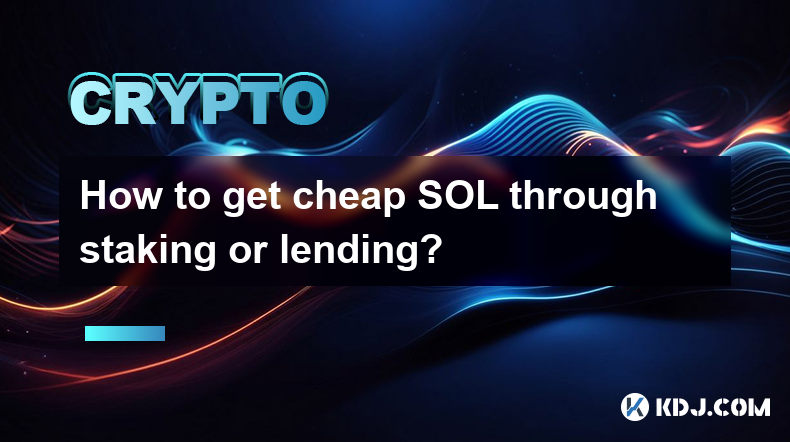
Understanding Solana (SOL) and its Utility
Solana (SOL) is the native cryptocurrency of the Solana blockchain, a high-performance platform designed for decentralized applications (dApps) and smart contracts. Its speed and scalability are key selling points, attracting developers and users. However, like any cryptocurrency, its price fluctuates. Acquiring SOL cheaply involves leveraging its inherent functionalities, primarily through staking and lending.
Staking SOL for Rewards
Staking is a crucial part of Solana's consensus mechanism. By locking up your SOL tokens in a validator node, you help secure the network and earn rewards in the form of additional SOL. The rewards are paid out periodically, effectively increasing your SOL holdings over time. This is one way to potentially "buy" SOL cheaper than the market price, as your earnings offset the initial investment cost.
- Find a reputable Solana validator: Research and select a validator with a proven track record of uptime and security. Avoid validators with questionable reputations.
- Delegate your SOL: Transfer your SOL to the chosen validator's address. The process usually involves using your Solana wallet.
- Earn staking rewards: Your rewards will accrue over time, depending on the validator's performance and the network's overall activity. The frequency of reward payouts varies.
- Understand the risks: While generally safe, staking involves risks, including validator downtime or potential slashing penalties for malicious actions (though unlikely for legitimate users).
Lending SOL for Interest
Lending your SOL on decentralized finance (DeFi) platforms allows you to earn interest on your holdings. These platforms act as intermediaries, matching lenders with borrowers. You earn interest for providing liquidity to the market. This approach offers a different avenue to acquire SOL indirectly, as the interest earned can be used to purchase more SOL.
- Choose a reputable DeFi platform: Research and select a platform with a strong security track record and a transparent fee structure. Security audits are crucial.
- Deposit your SOL: Transfer your SOL to the chosen platform's designated address. The process usually involves connecting your wallet.
- Earn interest: Your interest will accrue over time, depending on the platform's lending rates and market demand. Interest rates can fluctuate.
- Understand the risks: DeFi platforms carry inherent risks, including smart contract vulnerabilities and potential hacks. Always research thoroughly before using any platform.
Comparing Staking and Lending
Both staking and lending offer opportunities to acquire SOL indirectly, but they differ in several key aspects. Staking is generally considered less risky, but the rewards might be lower. Lending can offer higher returns, but carries a greater risk of smart contract exploits or platform failures. The choice depends on your risk tolerance and financial goals.
Understanding the Risks Involved
It's crucial to understand that neither staking nor lending guarantees profit. Market conditions and platform performance significantly impact returns. Always conduct thorough research and only invest what you can afford to lose. The cryptocurrency market is volatile, and prices can fluctuate dramatically. Diversification is essential to mitigate risk. Don't put all your eggs in one basket.
Maximizing Returns
To maximize your returns, consider these factors:
- Research validators and DeFi platforms carefully: Look for platforms with strong security measures, transparency, and a positive track record.
- Understand the fees involved: Both staking and lending platforms charge fees, which can impact your overall returns.
- Monitor your investments regularly: Keep track of your earnings and the performance of your chosen validator or platform.
- Stay informed about market trends: Understanding market fluctuations can help you make informed decisions.
Frequently Asked Questions
Q: Is staking SOL risk-free?
A: No, staking involves risks, including validator downtime and potential slashing penalties (though unlikely for legitimate users). However, it is generally considered less risky than lending.
Q: How much can I earn by staking SOL?
A: The annual percentage yield (APY) for staking SOL varies depending on the validator and network conditions. It can range from a few percent to over 10%, but this is not guaranteed.
Q: Are DeFi platforms safe for lending SOL?
A: DeFi platforms carry inherent risks, including smart contract vulnerabilities and potential hacks. Thorough research and due diligence are crucial before using any platform.
Q: What are the differences between staking and lending SOL?
A: Staking involves securing the network and earning rewards, while lending involves providing liquidity to a DeFi platform and earning interest. Staking is generally less risky, but potentially less rewarding than lending.
Q: How do I choose a reputable validator or DeFi platform?
A: Look for platforms with strong security measures, transparency, positive community reviews, and a proven track record. Consider factors like security audits and the team behind the project. Avoid platforms with questionable reputations or unclear terms of service.
Q: Can I lose my SOL by staking or lending?
A: While unlikely in staking with reputable validators, there's always a risk of loss in the cryptocurrency market. In lending, the risk is higher due to smart contract vulnerabilities and platform risks. You could lose some or all of your investment.
Q: How long does it take to earn significant returns from staking or lending SOL?
A: The time it takes to earn significant returns depends on the APY, the amount of SOL you stake or lend, and market conditions. It's a long-term strategy rather than a get-rich-quick scheme.
Q: What are the tax implications of staking and lending SOL?
A: The tax implications of staking and lending rewards vary depending on your jurisdiction. It's advisable to consult with a tax professional to understand your specific tax obligations.
Disclaimer:info@kdj.com
The information provided is not trading advice. kdj.com does not assume any responsibility for any investments made based on the information provided in this article. Cryptocurrencies are highly volatile and it is highly recommended that you invest with caution after thorough research!
If you believe that the content used on this website infringes your copyright, please contact us immediately (info@kdj.com) and we will delete it promptly.
- Binance Coin (BNB) Could Be on the Verge of a Major Price Movement as Attention Turns to Its Upcoming Debut on Kraken
- 2025-04-18 07:25:14
- a16z Crypto Doubles Down on LayerZero, Acquiring an Additional $55M Worth of ZRO Tokens
- 2025-04-18 07:25:14
- CARDANO: SLOW CLIMB OR STALLED MOMENTUM?
- 2025-04-18 07:20:12
- Crypto markets face a busy schedule of token unlocks this week, putting traders on alert
- 2025-04-18 07:20:12
- Cryptocurrencies Are Trading Slightly Up on Thursday as Traditional Financial Markets Closed Out a Low-Volatility Week.
- 2025-04-18 07:15:13
- Bitwise Announces the Listing of Four of Its Crypto ETPs on the London Stock Exchange (LSE)
- 2025-04-18 07:15:13
Related knowledge
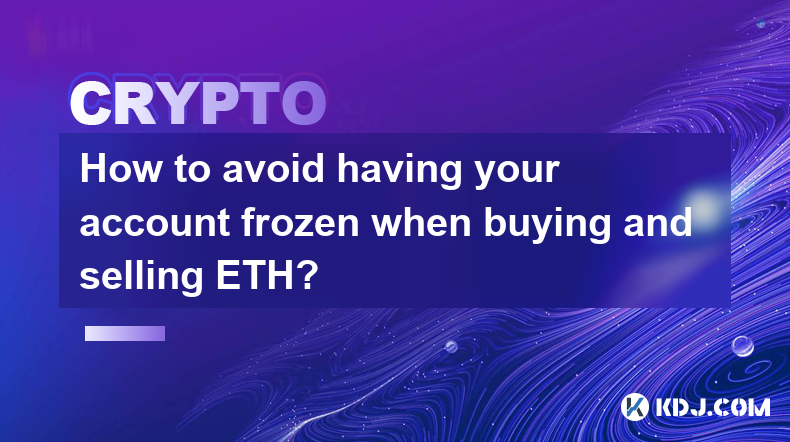
How to avoid having your account frozen when buying and selling ETH?
Apr 17,2025 at 12:42pm
When dealing with Ethereum (ETH), one of the most common concerns for users is the risk of having their accounts frozen. This can happen due to various reasons such as suspicious activity, regulatory compliance issues, or even technical errors. Understanding how to prevent this from happening is crucial for maintaining a smooth and uninterrupted trading...
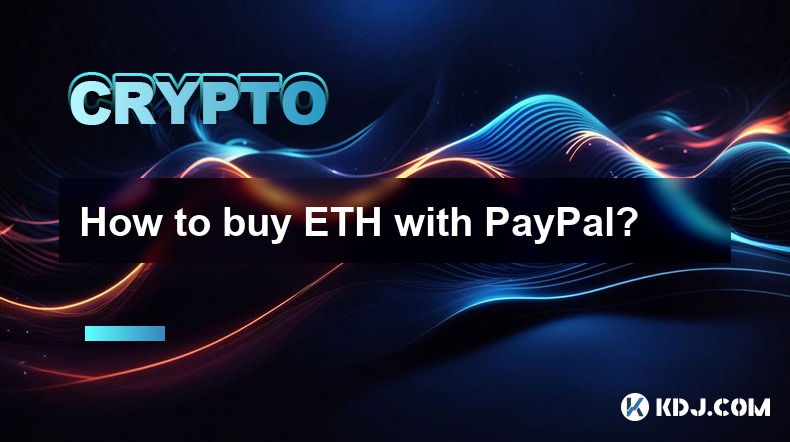
How to buy ETH with PayPal?
Apr 18,2025 at 06:14am
Introduction to Buying ETH with PayPalPurchasing Ethereum (ETH) using PayPal has become a convenient option for many crypto enthusiasts due to its widespread acceptance and ease of use. This article will guide you through the process of buying ETH with PayPal, detailing each step to ensure a smooth transaction. Whether you are new to cryptocurrencies or...
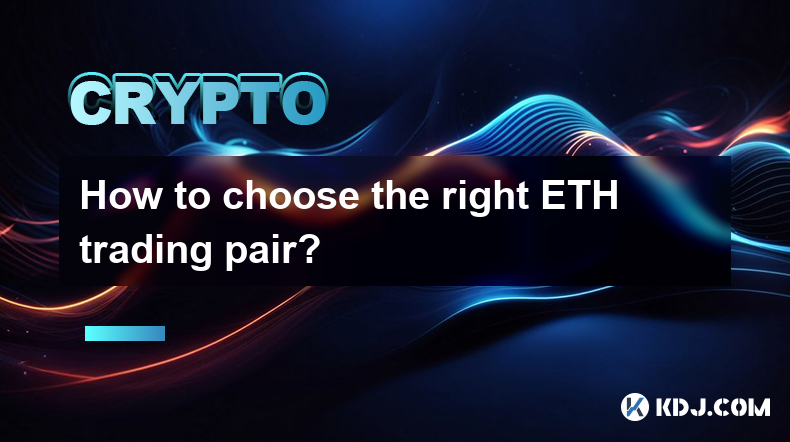
How to choose the right ETH trading pair?
Apr 17,2025 at 10:57pm
Choosing the right Ethereum (ETH) trading pair is crucial for maximizing your trading efficiency and potential profits. The selection of an appropriate trading pair can significantly influence your trading strategy, risk management, and overall success in the cryptocurrency market. In this article, we will explore the various factors you should consider...
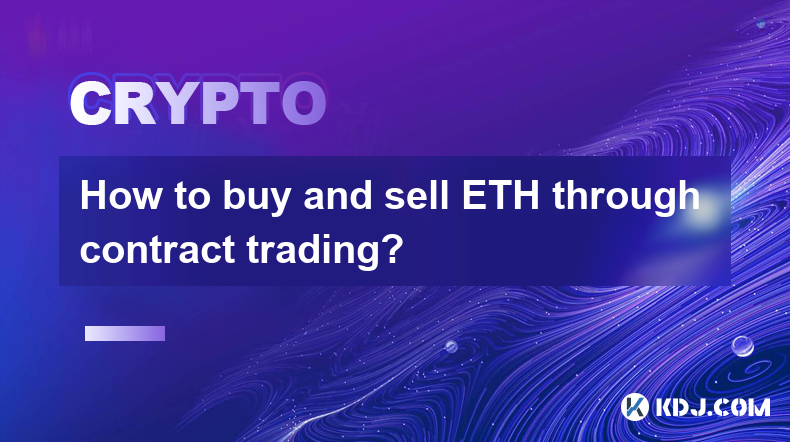
How to buy and sell ETH through contract trading?
Apr 17,2025 at 09:35am
How to Buy and Sell ETH Through Contract Trading? Contract trading, also known as futures trading, allows traders to speculate on the future price of Ethereum (ETH) without owning the actual cryptocurrency. This form of trading is popular among investors looking to leverage their positions and potentially increase their profits. In this article, we will...

What to do if the ETH trading platform runs away?
Apr 18,2025 at 01:01am
If you find yourself in a situation where your ETH trading platform has run away, it's crucial to act quickly and strategically to mitigate your losses and seek recourse. This article will guide you through the steps you should take to address this unfortunate scenario, ensuring you are well-informed and prepared to take action. Verify the SituationBefo...
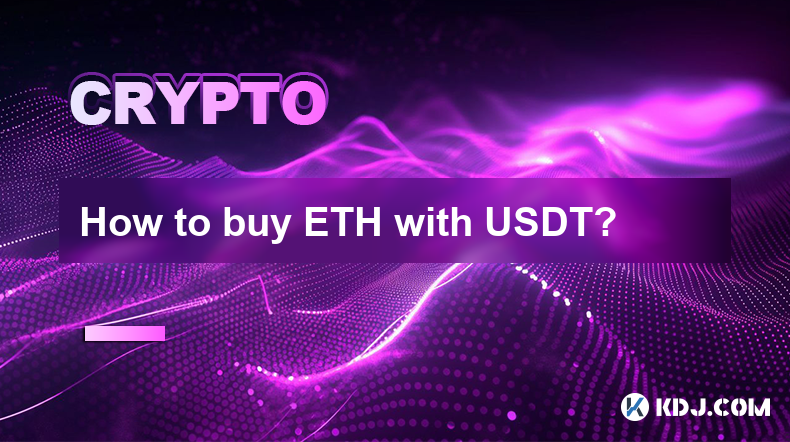
How to buy ETH with USDT?
Apr 17,2025 at 10:50pm
Introduction to Buying ETH with USDTBuying Ethereum (ETH) with Tether (USDT) is a common transaction within the cryptocurrency market, often used by traders looking to move between stablecoins and more volatile assets. This process can be executed on various cryptocurrency exchanges that support both ETH and USDT trading pairs. Understanding how to navi...

How to avoid having your account frozen when buying and selling ETH?
Apr 17,2025 at 12:42pm
When dealing with Ethereum (ETH), one of the most common concerns for users is the risk of having their accounts frozen. This can happen due to various reasons such as suspicious activity, regulatory compliance issues, or even technical errors. Understanding how to prevent this from happening is crucial for maintaining a smooth and uninterrupted trading...

How to buy ETH with PayPal?
Apr 18,2025 at 06:14am
Introduction to Buying ETH with PayPalPurchasing Ethereum (ETH) using PayPal has become a convenient option for many crypto enthusiasts due to its widespread acceptance and ease of use. This article will guide you through the process of buying ETH with PayPal, detailing each step to ensure a smooth transaction. Whether you are new to cryptocurrencies or...

How to choose the right ETH trading pair?
Apr 17,2025 at 10:57pm
Choosing the right Ethereum (ETH) trading pair is crucial for maximizing your trading efficiency and potential profits. The selection of an appropriate trading pair can significantly influence your trading strategy, risk management, and overall success in the cryptocurrency market. In this article, we will explore the various factors you should consider...

How to buy and sell ETH through contract trading?
Apr 17,2025 at 09:35am
How to Buy and Sell ETH Through Contract Trading? Contract trading, also known as futures trading, allows traders to speculate on the future price of Ethereum (ETH) without owning the actual cryptocurrency. This form of trading is popular among investors looking to leverage their positions and potentially increase their profits. In this article, we will...

What to do if the ETH trading platform runs away?
Apr 18,2025 at 01:01am
If you find yourself in a situation where your ETH trading platform has run away, it's crucial to act quickly and strategically to mitigate your losses and seek recourse. This article will guide you through the steps you should take to address this unfortunate scenario, ensuring you are well-informed and prepared to take action. Verify the SituationBefo...

How to buy ETH with USDT?
Apr 17,2025 at 10:50pm
Introduction to Buying ETH with USDTBuying Ethereum (ETH) with Tether (USDT) is a common transaction within the cryptocurrency market, often used by traders looking to move between stablecoins and more volatile assets. This process can be executed on various cryptocurrency exchanges that support both ETH and USDT trading pairs. Understanding how to navi...
See all articles
























































































